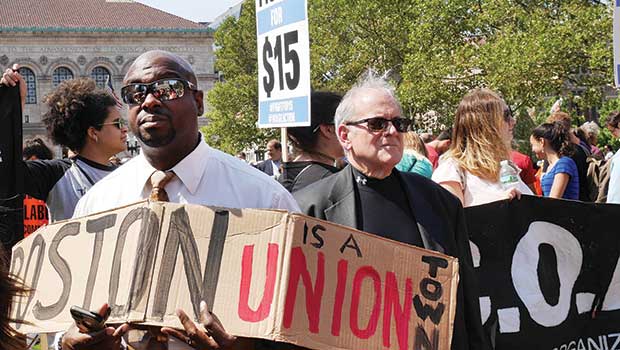Boston Workers, advocates rally for unions, pay
Fast food strike, march mark Labor Day

On a day many New Englanders celebrate as the unofficial last day of summer with beach trips and BBQ parties, hundreds of low-wage workers and labor advocates took to the streets of Boston to call attention to their fight for a $15 minimum wage and for union rights.

Author: Sandra Larson SEIU 32BJ members and their families gathered for the Labor Day rally.

Author: Sandra LarsonWorkers and advocates marched from Boston Common to Copley Square.
Marchers with bullhorns, musical instruments and signs in English and Spanish streamed down Newbury Street past shoppers and diners at outdoor brunch tables as they made their way from a gathering on Boston Common to a rally at Copley Square.
“When we fight …” came a repeated call in the high-spirited but peaceful march, followed by the response: “We win!”
At the Copley Square rally, workers spoke about their experiences in non-union and union jobs.
“Today I went on my first strike to demand $15 and a union — for me and my child,” said Christina Barnes, who holds jobs at both McDonald’s and Burger King and has an infant daughter. “With each paycheck I’m forced to make choices of which survival items to pay for, such as food, diapers and transportation to and from work, just to name a few.”
Having worked in fast food for four years, she still makes only $11 per hour, she said. Joining a union would transform her life, bringing paid family and medical leave, a livable wage and greater job security.
“We deserve better,” she told the crowd, drawing applause and cheers.
A janitor who works at a laboratory spoke of how for him, membership in SEIU 32BJ makes all the difference.
“Because I am a union member, I can provide for my family,” he said.
Organizers estimated the crowd at close to 1,000.
Making inroads
The Labor Day activities, which began with an early morning strike line of fast-food workers in front of McDonald’s on Tremont Street near the Common, come as the Fight for $15 campaign counts a number of recent victories in cities across the U.S.
In May, fast-food cooks and cashiers in New York City who in 2015 won a landmark $15 an hour minimum wage secured the passage of new laws curbing abusive scheduling practices at companies like McDonald’s and paving the way for fast-food workers to join together in their own organization. The new legislation will allow workers to continue their fight for higher wages and benefits and could serve as a model for fast-food workers in other cities.
In June, Minneapolis became the first Midwestern city to adopt a $15 an hour minimum wage, raising pay for an estimated 71,000 workers. Mayors in Cleveland and Atlanta this summer announced plans to raise pay for all city employees to $15 an hour. And in August, Democrats made higher wages a central piece of their “Better Deal” economic agenda, while voters in Kansas City, Missouri, approved a ballot measure by a more than 2-1 margin to raise the city’s minimum wage to $15 by 2022, though a new state law currently blocks the measure from taking effect.
Also in August, Duke University and Duke University Health System announced a raise to $15 per hour for 2,300 employees by mid-2019.
Since launching in fall 2012, the Fight for $15 campaign says, “by convincing everyone from voters to politicians to corporations to raise pay,” the campaign has succeeded in spurring wage hikes totaling more than $62 billion for 22 million underpaid workers, including more than 10 million who are on their way to $15 an hour.
“Workers have taken what many viewed as an outlandish proposition — $15 an hour — and made it the new labor standard” in such cities as New York, California, Seattle, Washington, D.C. and Minneapolis, according to a press release from organizers of Boston’s Labor Day strike and rally. Home care workers in Massachusetts and Oregon won $15 an hour statewide minimum wages, and companies including Facebook, Aetna, Amalgamated Bank, JP Morgan Chase and Nationwide Insurance have raised pay to $15 an hour or higher, the statement noted.
In Copley Square on Monday, Johnny McInnis, political director for the Boston Teachers Union, held a wide hand-lettered cardboard sign reading “Boston is a union town.” BTU was among a long list of unions and other groups participating in the day’s actions, including SEIU 32BJ and other SEIU locals, the Coalition for Social Justice, Jobs With Justice, Moral Movement MA, City Life/Vita Urbana and Raise Up Massachusetts.






